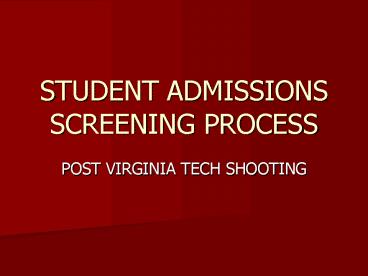STUDENT ADMISSIONS SCREENING PROCESS - PowerPoint PPT Presentation
1 / 16
Title:
STUDENT ADMISSIONS SCREENING PROCESS
Description:
... whether or not they have been charged or convicted of a crime and all related details. ... Have you ever been convicted of a misdemeanor, felony, or other crime? ... – PowerPoint PPT presentation
Number of Views:135
Avg rating:3.0/5.0
Title: STUDENT ADMISSIONS SCREENING PROCESS
1
STUDENT ADMISSIONS SCREENING PROCESS
- POST VIRGINIA TECH SHOOTING
2
RECENT RELEVANTVIRGINIA LAWS
- 23-2.21 Reporting of enrollment information to
Sex Offender and Crimes Against Minors Registry
(2006) - 23-2.1-3 Students high school records (2008)
3
23-2.21 REPORTING OF ENROLLMENT INFORMATION TO
SEX OFFENDER AND CRIMES AGAINST MINORS REGISTRY
- Each public and private two- and four-year
institution of higher education physically
located in the Commonwealth shall electronically
transmit enrollment data including (i) complete
name, (ii) social security number or other
identifying number, (iii) date of birth, and (iv)
gender to the Department of State Police. . . for
comparison with information contained in the
Virginia Criminal Information Network and
National Crime Information Center Convicted
Sexual Offender Registry File, for all applicants
that are offered acceptance to attend the
institution.
4
23-3.13 STUDENTS HIGH SCHOOL RECORDS
- Each public and private institution of higher
education may require that any student accepted
to and who has committed to attend, or is
attending, such institution provide, to the
extent available, from the originating school a
complete student record, including any mental
health records held by the school. These records
shall be kept confidential as required by state
and federal law, including the Family Educational
Rights and Privacy Act, 20 U.S.C. 1232g.
5
ADMISSIONS SCREENING METHODS
- Questions on the application directed at mental
health or criminal histories. - Interviews with applicants
- Essays by applicants
- Recommendations from appropriate professionals
- High school records
- Health and counseling
- Conduct
- Background checks
- Sexual predatory registry
- Other criminal behavior
6
IACLEA SCREENING RECOMMENDATIONS
- All members of the community upon application
(admission and employment) are asked whether or
not they have been charged or convicted of a
crime and all related details. - Institutions should conduct crimial record checks
for their students, faculty and staff as
appropriate. - 2008 The IACLEA Blueprint for Safer Campuses
- International Association of Campus Law
Enforcement Agencies
7
NATIONAL SURVEYMIDWESTERN HIGHER EDUCATION
COMPACT
- Conducted after April 16
- Published May 2008
- Questioned IHEs throughout the U.S. on
- Screening questions on undergraduate applications
- Implementation of background checks for
applicants - The Ripple Effect of Virginia Tech, Midwestern
Higher Education Compact, May 2008
8
SURVEY RESULTS CONVICTION
- Percentage of Institutions with item on
application pre 4/16 - 57 convicted of a felony
- 40 convicted on a non-specific crime
- 20 convicted of a crime involving aggression
or violence - Fewer than 2 reported adding such an item to
their application after April 16, 2007 - The Ripple Effect of Virginia Tech, Midwestern
Higher Education Compact, May 2008
9
EXAMPLE QUESTION from COMMON APPLICATION
- Have you ever been found responsible for a
disciplinary violation at an educational
institution you have attended from 9th grade (or
the international equivalent) forward, whether
related to academic misconduct or behavioral
misconduct, that resulted in your probation,
suspension, removal, dismissal, or expulsion from
the institution? Have you ever been convicted of
a misdemeanor, felony, or other crime?
10
SURVEY RESULTS MEDICATION
- Percentage of Institutions with item on
application pre 4/16 - 8 taking meds for psychiatric or psychological
condition - 3 received any psychiatric or psychological
treatment - 4 hospitalized for psychiatric reasons
- Over 90 of respondents considered adding such
items, less than 1 did - The Ripple Effect of Virginia Tech, Midwestern
Higher Education Compact, May 2008
11
YES TO SCREENING QUESTION
- Detailed information and documentation requested
- Evaluation and decision made on many factors
- Two choicesadmit or deny admissions
- Deny admissions
- Potential discrimination complaint ADA/504
- Admit
- Identify appropriate resources
- Follow up throughout time on campus
- Take on responsibility for students behavior
12
NC TASK FORCERECOMMENDATIONS
- System-wide check of pre-matriculation
- Identification of triggers that might require
background checks - Gap between h s graduation and application
- Withdrawals, leaves of absence
- Suspension or expulsion in K-12
- Dishonorable military discharge
- Fluctuation in grades
- Disturbing remarks in personal statement or
reference - Contradictions or inconsistencies within
application materials
13
MHEC SURVEY RESULTS BACKGROUND CHECKS
- Institutions reported
- Not considered54
- Considered but rejected14
- Pending decision15
- Implemented for 07-08--3
- Plans for future2
- Not sure12
- The Ripple Effect of Virginia Tech, Midwestern
Higher Education Compact, May 2008
14
LEGAL ISSUES BACKGROUND CHECKS
- Insufficient case or statutory law
- Potentially legal mine-field
- Student denied because of back ground check
- Student admitted and later commits crime
- Student admitted without background check and
later commits crime - False positive resulting in denial
- Family of Jessica Faulkner voluntarily dismissed
suit - Dickerson, Background checks in the University
Admissions Process, Journal of College and
University Law
15
LEGAL ISSUES (continued)
- Minor or young adult applicants
- Juvenile record may be sealed or expunged
- Clean Slate permission not to reveal in some
states - Terms adjudicated or diversion rather than
convicted - Courts do insist that admissions processes not be
arbitrary or capricious
16
SUMMARY
- Application information is self-report
- Background checks on applicants / students
cost/benefit is uncertain - Staff time
- Actual cost of the check per student
- Many students are minors (records sealed or
expunged) - Focus of effort may be more effectively placed
elsewhere - Admission screening does not preclude violence on
campus - Information only potentially valid up to point of
screening































